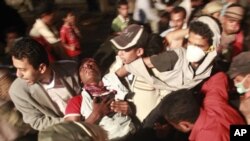Witnesses in the southern Yemeni city Taiz say at least 20 people have been killed when troops broke up an anti-government demonstration, while in nearby Zinjibar, government forces are trying to regroup after being routed by militants.
Witnesses report an air attack against militant positions in Zinjibar, after a deadly ambush of government troops outside the city.
Militants continue to hold key buildings in Zinjibar, Yemen's third largest city, which government troops abandoned in recent days.
The militants say they want to establish an Islamist emirate, and the government accuses them of having ties to the local terror affiliate, al-Qaida in the Arabian Peninsula.
Opponents of President Ali Abdullah Saleh accuse him of deliberately surrendering the city to show what he argues would be the alternative to his rule.
But others in the area say the militants do not have al-Qaida ties and question the idea of deliberate abandonment.
|
Former U.S. Ambassador to Yemen Edmund Hull talks to Mohamed Elshinnawi about possible scenarios in the country:
|
Never a tightly-knit country - torn by tribal, Islamist and now openly-expressed political divides - Yemen in the past week has edged closer to civil war as the fighting spread on several fronts.
Protesters in Taiz, also in the southwest, say government troops fired live ammunition in a pre-dawn raid Monday to clear a central square, the scene of demonstrations against Saleh since February.
Hospital sources say scores of other people were wounded in the attack, in which troops are also said to have set fire to tents in the protesters' encampment.
And in the capital Sana'a, fighting was heard after a truce was supposed to have ended street battles between government troops and members of the Hashid tribal federation, the nation's strongest.
Saleh, who protesters and other opponents want out after nearly 33 years of rule, is also suffering from military defections.
Former Defense Minister Abdullah Ali Aleiwa Sunday called on other military elements to abandon allegiance to Saleh. But he also asked that the institutions of the government be preserved.
That effort to have the president step down, but keep the workings of the government intact is likewise a key goal of regional and international efforts to resolve the crisis.
Long-time allies Saudi Arabia, leading a Gulf Cooperation Council initiative, and the United States have been urging Saleh to leave power.
But the president has three times backed out of a GCC deal that would see a transition to more representative power, most recently a week ago.
"He is now embattled from all directions and he is looking for a way out of course. There is a lot of pressure on him to step down. But he is, I want to say, he is that shrewd political survivor who can use all the possible cards," said Nasser Arrabiyee, Yemeni writer and political analyst in Sana'a.
Saleh's favorite card is the threat of anarchy that would follow in his wake. But with each passing day, as unrest engulfs more segments and more areas of the nation even as he remains in power, the value of that card appears to diminish.




